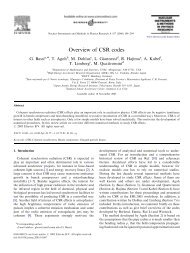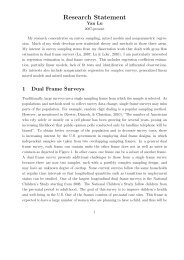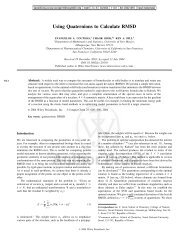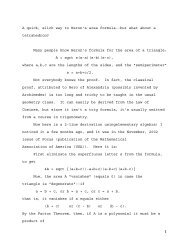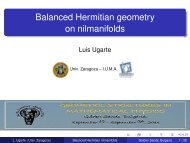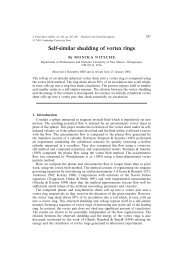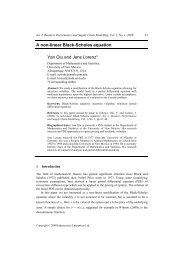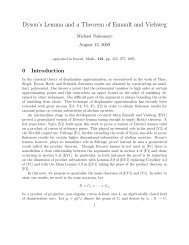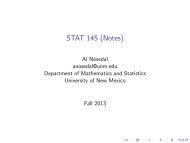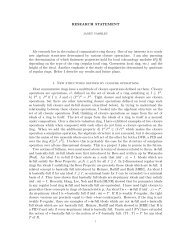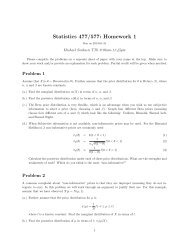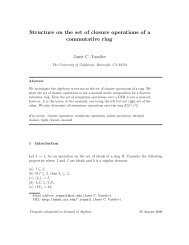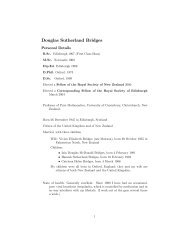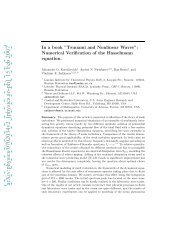OEO Office of Equal Opportunity - Department of Mathematics and ...
OEO Office of Equal Opportunity - Department of Mathematics and ...
OEO Office of Equal Opportunity - Department of Mathematics and ...
You also want an ePaper? Increase the reach of your titles
YUMPU automatically turns print PDFs into web optimized ePapers that Google loves.
152 ARTS AND SCIENCES<br />
Research Associate Pr<strong>of</strong>essors<br />
Andrzej Pastuszyn, Ph.D., University <strong>of</strong> Vienna<br />
Robert E. Royer, Ph.D., The University <strong>of</strong> New Mexico<br />
Laurel O. Sillerud, Ph.D., University <strong>of</strong> Minnesota<br />
Dorothy J. V<strong>and</strong>erJagt, Ph.D., The University <strong>of</strong> New Mexico<br />
Research Assistant Pr<strong>of</strong>essor<br />
Marco Bis<strong>of</strong>fi, Ph.D., University <strong>of</strong> Basel<br />
Charlotte Mobarak, Ph.D., The University <strong>of</strong> New Mexico<br />
Pr<strong>of</strong>essors Emeriti<br />
Robert B. L<strong>of</strong>tfield, Ph.D., Harvard University<br />
Edward Reyes, Ph.D., University <strong>of</strong> Colorado<br />
Beulah M. Woodfin, Ph.D., University <strong>of</strong> Illinois (Urbana)<br />
Major Study Requirements<br />
The <strong>Department</strong> <strong>of</strong> Biochemistry <strong>and</strong> Molecular Biology <strong>of</strong> the<br />
School <strong>of</strong> Medicine is responsible for teaching Biochemistry<br />
courses <strong>and</strong> for administering the Biochemistry Major in Arts<br />
<strong>and</strong> Sciences. It is expected that students will spend at least<br />
three semesters (not including summer) completing required<br />
biochemistry courses.<br />
Bachelor <strong>of</strong> Arts<br />
Math Calculus 162–163 (or 180-181)<br />
Intro Physics 151–151L, 152–152L (or 160–160L, 161–161L,<br />
262L)<br />
Intro Biol 201–202<br />
General & Prin Chem Lab 131L (or 121L); 132L (or 122L plus<br />
253L); Organic Chem 301–302, or 307–308; 303L–304L;<br />
Intro Physical Chem 315 (or 311–312)<br />
Intro Biochm 445L–446L<br />
In addition to the core courses the Bachelor <strong>of</strong> Arts requires:<br />
BIOC 448L or 3 credit hours from an approved advanced<br />
course in Biochemistry or a related discipline; CHEM 315; six<br />
credit hours from Biochemistry courses above Biochemistry<br />
450 <strong>and</strong> approved courses in related disciplines to a minimum<br />
<strong>of</strong> a total <strong>of</strong> 62 credit hours. No minor study is required.<br />
Bachelor <strong>of</strong> Science<br />
In addition to the core courses listed under the Bachelor <strong>of</strong><br />
Arts degree, the Bachelor <strong>of</strong> Sciences requires: BIOC 448L;<br />
CHEM 311–312 or CHEM 315 (or CHEM 311) <strong>and</strong> BIOC 451;<br />
six (6) credit hours from Biochimestry courses above BIOC<br />
450 <strong>and</strong> the minimum total <strong>of</strong> approved courses in related disciplines<br />
is 65 credit hours. MATH 264 is a required corequisite<br />
for CHEM 311–312. No minor study is required.<br />
<strong>Department</strong>al Honors<br />
Students who will have completed 6 hours <strong>of</strong> Senior Research<br />
(Biochemistry 497–498) may submit a Senior Thesis based<br />
on their Senior Research project. The award <strong>of</strong> Honors will be<br />
based on the quality <strong>of</strong> the thesis <strong>and</strong> on an oral presentation<br />
<strong>of</strong> the research. (Note that the University requires an overall<br />
grade point average <strong>of</strong> 3.20 for Honors.)<br />
The Chairperson <strong>of</strong> the <strong>Department</strong> <strong>of</strong> Biochemistry <strong>and</strong><br />
Molecular Biology will be responsible for the administration<br />
<strong>of</strong> the Biochemistry Major Program <strong>and</strong> will submit an Annual<br />
Report on the program to the Dean <strong>of</strong> the College <strong>of</strong> Arts <strong>and</strong><br />
Sciences. As with other Arts <strong>and</strong> Sciences Programs, the<br />
Biochemistry Undergraduate Major may not be significantly<br />
modified without prior advice <strong>and</strong> approval from the Arts<br />
<strong>and</strong> Sciences Curriculum Committee <strong>and</strong> from the Arts <strong>and</strong><br />
Sciences Faculty.<br />
Biochemistry (BIOC)<br />
201. Current Issues in Human Reproduction. (3)<br />
Interdisciplinary course on the principles <strong>of</strong> human reproduction<br />
<strong>and</strong> the associated clinical, social <strong>and</strong> ethical issues,<br />
taught by faculty <strong>of</strong> the Division <strong>of</strong> Women’s Health Research,<br />
School <strong>of</strong> Medicine.<br />
*423. Introductory Biochemistry. (3)<br />
Introductory course into metabolic reactions within the cell<br />
with emphasis on a chemical underst<strong>and</strong>ing <strong>of</strong> the way the<br />
cell integrates <strong>and</strong> controls intermediary metabolism; also<br />
included are quantitative problems in pH control, enzyme<br />
kinetics <strong>and</strong> energetics. BIOC 423 should not be taken by<br />
students who anticipate majoring in Biochemistry.<br />
Prerequisite: CHEM 302 or 308. {Fall, Spring}<br />
*445L. Intensive Introductory Biochemistry I. (4)<br />
An introduction into the physical <strong>and</strong> chemical properties <strong>of</strong><br />
proteins <strong>and</strong> enzymes; enzymic catalysis; structure, synthesis<br />
<strong>and</strong> processing <strong>of</strong> nucleic acids <strong>and</strong> proteins.<br />
Prerequisite: CHEM 302 or 308. Graduate students see<br />
545L. {Fall}<br />
*446L. Intensive Introductory Biochemistry II. (4)<br />
An introduction to intermediary metabolism <strong>and</strong> hormonal<br />
control <strong>of</strong> catabolic <strong>and</strong> anabolic pathways.<br />
Prerequisite: 445L. Graduate students see 546L. {Spring}<br />
*448L. Biochemical Methods. (3)<br />
Biochemical techniques including chromatographic <strong>and</strong> electrophoretic<br />
purification <strong>of</strong> enzymes, determination <strong>of</strong> enzyme<br />
parameters (Vm, Km), fractionation <strong>of</strong> subcellular organelles,<br />
isolation <strong>of</strong> chromatin, biosynthesis <strong>of</strong> protein, analysis <strong>of</strong><br />
DNA.<br />
Pre- or corequisite: 446L. {Spring}<br />
451. Physical Biochemistry. (4).<br />
A quantative physical chemical approach to analyzing macromolecular<br />
structure <strong>and</strong> function; electrophoretic <strong>and</strong> hydrodynamic<br />
methods; mass spectrometry; optical <strong>and</strong> vibrational<br />
spectroscopic methods; nuclear magnetic resonance; diffraction<br />
methods; <strong>and</strong> computational techniques.<br />
Prerequisite: 445 <strong>and</strong> (CHEM 311 or 315). {Spring}<br />
463./563. Biochemistry <strong>of</strong> Disease I. (3)<br />
Five three-week topics, each designed to develop some basic<br />
concepts <strong>of</strong> biochemistry, cell <strong>and</strong> molecular biology in the<br />
context <strong>of</strong> disease states.<br />
Prerequisite: 423 or 446L. Graduate students see 563. {Fall}<br />
464./564. Biochemistry <strong>of</strong> Disease II. (3)<br />
Five three-week topics, each designed to develop some basic<br />
concepts <strong>of</strong> biochemistry, cell <strong>and</strong> molecular biology in the<br />
context <strong>of</strong> states.<br />
Prerequisite: 423 or 446L. Graduate students see 564.<br />
{Spring}<br />
*465. Biochemistry Education. (3)<br />
Seminars <strong>and</strong> readings in current methods <strong>of</strong> Biochemistry<br />
education. The course includes a practical experience in<br />
Biochemistry education techniques <strong>and</strong> practices.<br />
Prerequisite: minimum grade <strong>of</strong> B in BIOC 446. Restriction:<br />
permission <strong>of</strong> instructor.<br />
497. Senior Honors Research. (1-3 to maximum <strong>of</strong> 6)<br />
[1-3] ∆<br />
Senior thesis based on independent research.<br />
Restriction: permission <strong>of</strong> instructor. {Summer, Fall}<br />
498. Senior Honors Research. (1-3 to a maximum <strong>of</strong><br />
3) ∆<br />
Senior thesis based on independent research.<br />
Restriction: permission <strong>of</strong> instructor. {Spring}<br />
499. Undergraduate Research. (1-3 to a maximum <strong>of</strong><br />
3) ∆<br />
Offered on a CR/NC basis only. Prerequisite: permission <strong>of</strong><br />
instructor. {Summer, Fall, Spring}<br />
UNM CATALOG 2006–2007 Symbols, page 611.



